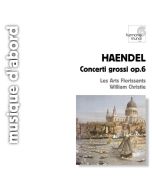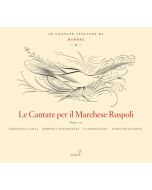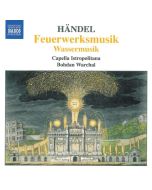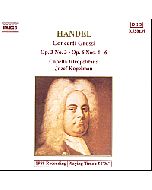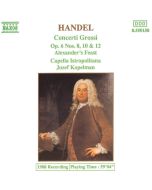
(Produkt nie został jeszcze oceniony)
kompozytor
Handel, George Frideric
tytuł
HANDEL: Saul
wykonawcy
Beekman, Marcel, Cordier, David, Frankfurt Baroque Orchestra, Junge Kantorei, Martini, Joachim Carlos, McFadden, Claron, Schlick, Barbara, Schoch, Knut, Schwarz, Gotthold
nr katalogowy
8.554361-63
opis
In July 1738 the cancellation of the intended opera season was announced by the manager of the King's Theatre in the Haymarket, Johann Jakob Heidegger, after the failure of the Opera of the Nobility in 1737 and now a lack of sufficient subscribers for a new season. Handel, who had been engaged by his former partner as music director for the following season of opera for a fee of £1000, was able, in consequence, to hire the theatre from Heidegger for his ventures in English oratorio. To this end he busied himself with the oratorio Saul, while still working intermittently on the Italian opera Imeneo, for which there seemed no immediate prospect of performance. •
Saul brought the first collaboration between Handel and Charles Jennens, a country landowner of substantial wealth from Gopsall in Leicestershire, known for his eccentricities of behaviour and display of wealth. Dr Johnson may have seen fit to describe Jennens as an English 'Solyman the Magnificent', but he was, nevertheless, a man of taste and discernment. He had been enthusiastic in collecting works by Handel and in 1735 had supplied him with a libretto, presumably for the oratorio Saul. He was to continue his active collaboration with Handel with his adaptation of Milton's L'Allegro, il Penseroso ed il Moderato, Messiah and Belshazzar. Handel was his frequent guest at Gopsall and the relationship between the two men was more amicable than might ever have been expected, given their temperaments. At any rate, Handel was here willing, as in his later collaborations with Jennens, to pay some attention to the latter's advice and suggestions and it was through Jennens that he wrote new music for the elegy on Saul and Jonathan, rather than re-using music he had written for the funeral of Queen Caroline the previous December.
nośnik
CD x 3
wydawca
Naxos
data wydania
11.01.1999
EAN / kod kreskowy
636943436127
119,00 zł
Produkt na zamówienie
Wysyłka ustalana indywidualnie.
Darmowa wysyłka dla zamówień powyżej 300 zł!
Darmowy kurier dla zamówień powyżej 500 zł!
sprawdź koszty wysyłki
